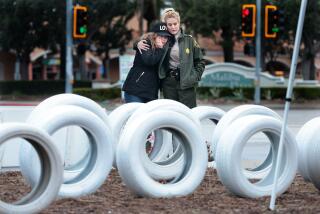Roadside Death Markers: Issue Is a Two-Way Street
BOSTON — On the nation’s roadsides, after the twisted metal from a fatal wreck is cleared, a mound of flowers, a marker or a little cross is often erected: a makeshift memorial to tragedy.
Paul Chizook wants to replace those temporary reminders with something more permanent. The Massachusetts resident is proposing signs emblazoned with the names of car crash victims, and the dates they were killed, along the state’s highways.
Although such tributes may seem like grim distractions to some, to Chizook they would serve as a powerful reminder of the dangers that lurk along the highway.
“Just that message that you get from a uniform placard alongside the road to recognize and know that someone died here, I think that’s sufficient to take your foot off the gas,” said Chizook, who lives in Tyngsboro, about 30 miles northwest of Boston.
The idea of roadside memorials has sparked debate beyond Massachusetts. In Virginia, measures to have the state install roadside memorials were proposed earlier this year but failed to get approval.
Rather than assume responsibility for roadside memorials, some states, such as California, ban them outright. Texas allows them with some restrictions. Illinois officials discourage them.
James Keaton, chairman of the national Alliance for Traffic Safety, said roadside memorials pose a hazard and might actually lead to more highway deaths.
“If we put memorials up at every location on our highways and byways where a fatality or serious injury has occurred, are we potentially obstructing the clear view and right of way of motorists and road users?” he asked.
Keaton said his organization, made up of safety experts, has not officially taken a stand on roadside memorials but would probably lean against supporting them.
John Carlisle, Massachusetts Highway Department spokesman, had similar concerns.
“A roadway speckled with various roadway memorials could pose a safety problem. It could have the potential to compound a situation that’s already tragic,” Carlisle said.
Makeshift memorials are common in countries such as Italy and Greece. And in the Republic of Ireland, the government marks the place of fatal accidents with a warning sign emblazoned with a black dot and the words “Traffic Black Spot.”
Massachusetts has no bans or detailed guidelines on makeshift memorials.
Localities have their own policies. Last year, in Pembroke, Mass., officials rejected a man’s request to erect a white cross where his son died in a crash the previous year.
Chizook said Massachusetts could design some sort of uniform markers made of reflective material, so they could be seen at night. His local legislator, Rep. Colleen Garry, was receptive to the idea and filed a bill on his behalf.
Also receptive was Rep. Joseph Sullivan, state House chairman of the Transportation Committee. But he and Garry said they would seek the permission of the victims’ families to prevent causing them further pain.
A competing piece of legislation would limit the time makeshift memorials could remain to 30 days. It would also require a permit.
Chizook said one of the unofficial memorials he passes on Interstate 495 near Lowell, Mass., is dedicated to Raymond Bergeron, a Department of Public Works employee who was struck and killed a week before his retirement.
“It does serve as a very poignant reminder how easy it is to be killed, even on a straight stretch of 70-mph roadway,” he said.
More to Read
Sign up for Essential California
The most important California stories and recommendations in your inbox every morning.
You may occasionally receive promotional content from the Los Angeles Times.










